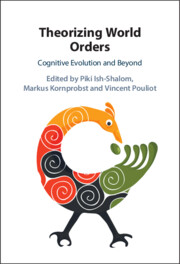Book contents
- Theorizing World Orders
- Theorizing World Orders
- Copyright page
- Dedication
- Contents
- Tables
- Preface
- Note on the Cover Image
- 1 Cognitive Evolution and World Ordering
- 2 Power in Communitarian Evolution
- 3 In Consideration of Evolving Matters
- 4 The Phenomenology of Cognitive Evolution
- 5 Narratives in Cognitive Evolution
- 6 Cognitive Evolution and the Social Construction of Complexity
- 7 Refugees and Their Allies as Agents of Progress
- 8 Holding the Middle Ground
- 9 Conclusion
- References
1 - Cognitive Evolution and World Ordering
Opening New Vistas
Published online by Cambridge University Press: 18 November 2021
- Theorizing World Orders
- Theorizing World Orders
- Copyright page
- Dedication
- Contents
- Tables
- Preface
- Note on the Cover Image
- 1 Cognitive Evolution and World Ordering
- 2 Power in Communitarian Evolution
- 3 In Consideration of Evolving Matters
- 4 The Phenomenology of Cognitive Evolution
- 5 Narratives in Cognitive Evolution
- 6 Cognitive Evolution and the Social Construction of Complexity
- 7 Refugees and Their Allies as Agents of Progress
- 8 Holding the Middle Ground
- 9 Conclusion
- References
Summary
This chapter provides an overview of how Adler’s social theory of cognitive evolution helps us study international orders. First, we compare and contrast world ordering theory with its main alternatives in International Relations, starting with Ikenberry’s. Second, we elaborate on the key building blocks of cognitive evolution theory, including evolution and process, communities of practice, creativity and learning, social order and bounded progress. Third and finally, we raise a number of critical questions about Adler’s theory, in order to chart new avenues for future research. We ask about the role of material forces, the interaction of multiple orders, the conceptualization of power and agency, the place of communication and the normative extensions that the theory suggests. We conclude by presenting the following chapters in the book.
Keywords
Information
- Type
- Chapter
- Information
- Theorizing World OrdersCognitive Evolution and Beyond, pp. 1 - 34Publisher: Cambridge University PressPrint publication year: 2021
